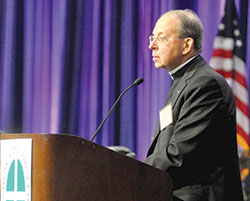Bishops vote to make religious liberty a permanent committee

Baltimore Archbishop William E. Lori speaks on June 15 during the U.S. Conference of Catholic Bishops’ annual spring assembly in Indianapolis. (Photo by Sean Gallagher)
By Sean Gallagher
Their U.S. bishops voted on June 15
to make their Ad Hoc Committee for Religious Liberty a permanent standing committee.
The 132-53 vote came on the second day of the bishops’ spring meeting in Indianapolis after much discussion. There were also five abstentions. A simple majority was required for the approval of the measure.
The bishops’ action came less than a week before the start of U.S. Conference of Catholic Bishops’ (USCCB) fifth annual Fortnight for Freedom, which is observed on June 21-July 4. It is a two-week period of prayer, advocacy and education on religious freedom.
(See more news and photos from the USCCB Meeting)
Before the vote, Baltimore Archbishop William E. Lori, who has served as chairman of the committee since its creation in 2011, spoke in favor of making it a permanent committee. He argued that the need for the body stretches beyond the specific legal and public policy issues that continue to emerge, which challenge religious liberty.
“Rather, the very idea of religious freedom and its roots in human nature is challenged,” he said, “along with the right of religious people and institutions to raise their voices in the public square, and to perform ministries that serve the common good in accordance with their religious and moral convictions.”
Archbishop Lori also expressed his hope the ad hoc committee’s work up to now and in the future would help to “plant the seeds of a movement for religious freedom, which will take years of watering and weeding in order for it to grow, to grow strong and to bear fruit.”
“In the face of these challenges, our voice is vital,” he said. “Debates about religious freedom in our country are often, sadly, polarizing. In our tumultuous political culture, Catholic laity must be equipped to participate in conversations about the future direction of our country.”
In the discussion that followed Archbishop Lori’s presentation, some bishops spoke in favor of establishing a standing committee on religious freedom. Among them was Washington Cardinal Donald W. Wuerl.
“The challenge to religious liberty is a growing one,” he said. “The dominant culture increasingly now finds that it’s not just a matter of disagreeing with religious principles and positions. But there’s a certain level of hostility becoming more and more evident. … This problem is not going to go away.”
Cardinal Timothy M. Dolan, who was USCCB president when the ad hoc committee was created, also spoke in favor of making it permanent.
He noted that bishops around the world “look to us in the United States [as] real quarterbacks when it comes to the defense of religious freedom,” and added that he hears from our “ecumenical partners how deeply they cherish our leadership on this issue.”
“I think it’s enhanced the cause of interreligious and ecumenical dialogue, because we’re not the only ones concerned,” Cardinal Dolan said. “So, we need some permanence. We need some stability. And I think this is the way to go.”
Some bishops felt the ad hoc committee did not need to become permanent because they felt religious liberty could be addressed by existing standing committees.
Cardinal Joseph W. Tobin of Newark, N.J., agreed with this position, and also noted that it was “very unfortunate” that the vote on the committee was taking place a day after the bishops allowed its working group on immigration to cease to exist after it completed its work.
However, after the vote on the religious liberty ad hoc committee, Cardinal Daniel N. DiNardo of Galveston-Houston, USCCB president, announced that he would allow the working group on immigration to continue its efforts, prompting applause from the bishops.
In a news conference after the session, Archbishop Lori said he was grateful “it was not a pro forma discussion, but rather an opportunity for bishops in a wonderfully respectful and dialogic way, to express their views about” religious liberty.
“It’s a big step to establish a standing committee,” he said. “And so no one would expect it to be a walk in the park.”
(To learn more about the USCCB’s promotion of religious freedom, visit www.usccb.org/issues-and-action/religious-liberty.) †
